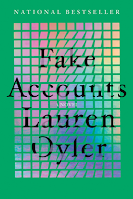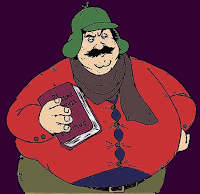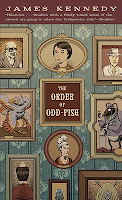From Boswellian Jenny Chou:
Here at Boswell, we are excited to host author James Kennedy in person on Thursday, June 9th for the paperback release of his sci-fi thriller Dare to Know, a Times (UK) Best Book of 2021. James joins me on the blog today for my Five Questions series, and I admit that the first thing I want to ask him about is the twisty ending of his book, but (unfortunately) we don’t believe in spoilers at Boswell. Before we dive into some non-spoilery questions, here’s a short recap of this wild thrill ride of a novel:
Once the top salesperson for a phenomenally successful tech company called Dare to Know, the unnamed narrator’s career has crashed and burned, leaving him short on funds and desperate to close a deal. Dare to Know sells death dates. That’s right, their formula will predict with 100% accuracy exactly when their client’s time is up. Stealing their potential clients is a company that will predict not only when, but also how. Yikes! Are people really interested? You bet they are! After a nightmare sales call and a spinout into a snowbank during a blizzard, our embittered narrator violates the very first rule of Dare to Know: he calculates his own time of death. What follows becomes an unnerving slide into chaos, because the formula is never wrong, and it predicted he died twenty-three minutes ago. And while there is someone from his past smart enough that she might be able to make sense of all this, unfortunately he broke her heart decades earlier, lending a whole lot of self-realization and regret to our narrator’s current mess. Twisty, thought provoking, and delightfully quirky doesn’t begin to scratch the surface, so set aside a day and the better part of a night, because putting your copy of Dare to Know aside won’t be an option.
JENNY CHOU: Thanks for joining me on the blog, James! Speculative sci-fi can go off in so many philosophical and weird directions, which is why I enjoy it! My first question has got to be about inspiration. How did you come up with the idea of a company that sells death dates? Are there any authors who inspired you that blog readers should check out?
JAMES KENNEDY: Thanks for having me! The idea comes from my own personal vibe shift with computers. When I was a kid I loved programming goofy video games on my Atari 800XL. When I was in my twenties I was fascinated by the handmade, weirdos-only feel of the early internet. Into my thirties I enjoyed working as a computer programmer.
But then something about computers began to feel rotten to me. The feeling in the industry went from a “We can change the world!” optimism to a joyless grind and a cursed realm for grifters. I watched a lot of startups flame out, or become sad shells of what they once were (indeed, I worked for such a company), and I wanted to portray that cultural transition in the tech world.
But it was also a personal thing. For me, computers used to be all about exploration, creativity, and liberation. But starting around 2012, for me they began feeling more and more like a portal to an icky zone of surveillance, distraction, and propaganda. I wanted to explore that gross new feeling - not a realistic account (other books like Lauren Oyler’s Fake Accounts or Anna Wiener’s Uncanny Valley have that covered) but in a more indirect way that expresses feelings that are difficult or even embarrassing to say otherwise. Basically: isn’t this all starting to feel demonic?
And what happens to us when our most intimate details are reduced to data that can be bought, sold, and exploited? Indeed, what if everything about you was so humiliatingly subject to algorithms that a company could even sell you the precise time and date of your own death? And just like so many other once-dazzling innovations - what happens when your death becomes just another trite datum? That’s part of what Dare to Know is about.
As for inspirations, I love the science fiction short stories of Ted Chiang. He often takes a speculative premise and pushes it to its logical limit. I was also inspired by Philip K. Dick because he often crosses that limit into something trippier and weirder. I wanted Dare to Know to begin in our familiar world and slowly pull the reader into something more nightmarish.
JC: Did you start Dare to Know with the concept of an algorithm that predicts death dates, or with a character, or with the plot, or did you start somewhere else? And did you work from an outline or did you just let the story unfold as you wrote?
Dare to Know started out as a simple short story, but it wouldn’t stay that way. I realized that there was longer and deeper story to be told, delving into the narrator’s life and exploring the social and even cosmic implications of the technology. Dare to Know is about death, but it’s also about reckoning with the life you’ve lived. The choices you’ve made, the opportunities you’ve blown, the memories that you can’t get away from. The novel naturally grew to accommodate that. The original short piece ended up serving as a kind of outline, although an outline that was itself constantly changing as my developments warped the original story. It’s a roundabout, improvisational way of writing, but it leads me to genuine discoveries that excite me. Hopefully the reader will feel that excitement too. Anyway, it’s exactly how I wrote my first book as well, so I guess I’m stuck with this method.
JC: You studied physics in college. Can you explain how you took your scientific knowledge and incorporated it into what I hope is a fictional formula for the calculation of death dates?
JK: Yeah, like my narrator, I was a physics and philosophy double major in college. I drew on that background to craft an invented physics of thanatons (“death particles”), and I situated it in the story in the context of real-life physics like virtual particles and black hole theory.
Making up the fake science of Dare to Know was such a pleasure. It started from me not wanting the client to learn their death date from an app or a computer. That felt banal - and indeed, right before Dare to Know was about to hit bookstores, a movie came out called Countdown in which you find out the time you die from an app. Oh, you haven’t heard of it? That’s because the movie flopped. (Even I haven’t seen it.) Anyway, the time of one’s death is bizarre information; there should be a bizarre way of finding it out.
In Dare to Know, one’s death-date is calculated using a surreal mathematics that can’t be performed by a computer, but only by hand, by a human - a “subjective mathematics” in which both the math problem and its human solver change each other through the execution of the algorithm. I got the idea from the weirdness of quantum physics, in which the observer is thought to affect the existence of what they’re measuring.
In my book, the process of calculating a client’s death takes the form of an intense one-on-one interview not unlike the scene in Blade Runner where an investigator asks odd questions to a subject to determine if they’re secretly a robot (“You're in a desert, walking along in the sand when all of a sudden you look down and see a tortoise . . . "). In Dare to Know, the subject is asked to free-associate when given prompts of nonsense phrases, and their responses give the clues that lead to calculating their death-date. Since computers can’t be used, the interviewer must be constantly consulting bulky reference books in order to perform the death date calculation, while he and the subject exchange nonsense phrases. I liked the idea of a rigorous mathematical process that also feels like the chanting of a supernatural babbling ritual; indeed, a lot of Dare to Know is concerned with blurring the line between the science and the occult.
JC: Your cynical, unnamed narrator stumbles through his life making all kinds of wrong turns, which he freely admits to when looking back, but all his issues mean he’s not always the most likable character. What are the challenges of writing an anti-hero, and how did you pull off convincing readers to go along for the ride? Because once I started reading, I couldn’t put your book down. Also, why doesn’t he have a name?
JK: Thank you! You’re my kind of reader. I have a different take on anti-heroes, though: if you write a book with a traditionally “likable” main character, then you might be in trouble. My favorite books have unlikable characters. The narrator of Frederick Exley’s A Fan’s Notes is a drunk, self-sabotaging blowhard. Ignatius Reilly of John Kennedy Toole’s Confederacy of Dunces is a reactionary incel who can’t stop belching and farting. The narrator of Notes From Underground is a passive-aggressive prick. Even Charles Ryder of Brideshead Revisited is a privileged nullity. I love these books, and I’m not alone!
Some readers get upset if you have an “unlikeable” main character who isn’t immediately correct about everything in the way they’d prefer - or if the writer isn’t always anxiously whispering to the reader, “Hey, I know this guy is bad! You and I, the good people, can both agree he’s bad!” Such readers act as if you had literally made a bad person and set him loose on the world to wreak havoc. I’m fine alienating those readers. I’m especially happy if they bought my book, because that way I made them suffer and took their money. Win-win! (There: wasn’t that more fun to read than if I was being likable?)
(JC: HA! I am laughing.)
“Unlikability” is great untapped potential energy. Perhaps counterintuitively, we trust someone more if they’re being candid about their flaws. (At one point in Dare to Know, after the narrator says something particularly awful, he adds as an aside, “Save your contempt, I know it’s snotty. Try telling your own life story, commit to reporting honestly, see how likeable you come across.”)
We’re all problematic. We’re all unlikeable. It’s energizing to write in a way that leaves one open to objection. The alternative - writing in a way that always hedges your bets with careful caveats to indicate you are a Right Thinking Good Person - feels like an artistic dead end.
As for leaving the narrator nameless - it’s a sly trick to build intimacy with the reader. If I gave him the name “Harold Bloopman” or whatever, then you could more easily hold him at arm’s length and say to yourself, “Well, of course that’s what Harold Bloopman would say.” But if he doesn’t have a name, you can’t distance yourself from him quite so easily. You become a little bit complicit.
JC: And honestly, after the first couple pages, I hardly notices his lack of a name. I love the concept that the reader becomes a little bit complicit. Okay, last question. Before you published Dare to Know, which is for adults, you wrote the YA novel The Order of Odd Fish. What’s next for you? More YA or another speculative sci-fi thriller mashup? Or maybe your writing journey is taking you in another direction. With your imagination, I feel that anything is possible.
JK: That is sweet to say, thank you! As it turns out, my next novel is also being published by Quirk next year, in 2023. It’s another book for adults called Bride of the Tornado. It’s more of a horror love story - Rosemary’s Baby meets Twin Peaks meets Twister or the Weather Channel, I guess. It’s scary and romantic and weird - like Twilight put through a David Cronenberg machine.
One day I’ll return to young-adult and children’s books, though. I still keep a foot in that world through a film festival that I’ve run for the past ten years called the 90-Second Newbery Film Festival, in which kid filmmakers create short movies that tell the stories of Newbery-winning books in about ninety seconds. Before the pandemic hit, we would feature the best movies at big screenings in about a dozen cities all over the country. Hey, maybe next year we can bring the film festival to Milwaukee!
JC: A film festival of Newbery books? That's super cool! Thanks for joining me on the blog today, James. We are excited to host you on June 9th in-person at Boswell - click here to register to attend. Blog readers, be sure to follow James on Twitter at iamjameskennedy.








No comments:
Post a Comment